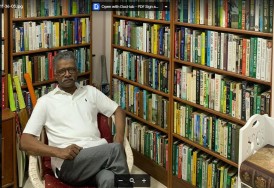‘Freaking’ Out on Cricket Books
Stanley Carvalho |
A “cricket freak” since his school days, he bought his first book on October 6, 1975 for the princely sum of rupees three. The book was Tiger’s Tale, an autobiography of Mansour Ali Khan Pataudi, the legendary Indian cricketer. The book takes pride of place among 800-plus cricket-related books in the possession of bibliophile Vincent Sunder, ostensibly the largest such private collection in Bangalore.
The neatly-arranged books at his spacious home include some rare treasures. I look for the oldest in the collection which is The Jubilee Book of Cricket by Prince Ranjitsinhji, signed as a Christmas gift in 1897. There’s the faded autobiography of Sir Pelham Warner, the grand old man of English cricket and two signed books (1935) of English test cricketer, Sir Jack Hobbs. Another rare gem, now out of publication is Indian sports writer Clayton Murzello’s Caught & Told.
Sunder, who grew up in Bangalore playing cricket has some prized possessions including a couple of limited editions. He pulls out Across the Oceans, a tome on the English cricketers’ tours to Australia and New Zealand from 1861-1962. His copy is number 54 out of only 100 copies printed and one of the most expensive ones in his acquisition.
Another is of Australian test cricketer Archie Jackson’s story by David Frith, the Keats of cricket. Sunder’s copy is 706 in a limited edition of 1000 and out of print since 1975.
The impressive collection ranges from autobiographies and biographies, coffee table and pictorial books to history, humour, statistics and trivia. While browsing through his nicely categorized books (arranged by author-last name), I spot almost all the cricketing legends – W.G. Grace, Don Bradman, Gary Sobers, Bill Lawry, the Chappell Brothers, Clive Lloyd, Tony Greig, David Gower, Richard Hadlee, Martin Crowe, Zaheer Abbas and scores of others.
A set of Wisden books and books on umpires catches my eye.
Books about and by Indian cricketers are dime-a-dozen. All the four works written by Sunil Gavaskar as well as books written about him sit gracefully alongside those of Lala Amarnath, Ajit Wadekar, Sandeep Patil, Sachin Tendulkar, Saurav Ganguly, Rahul Dravid, M.S. Dhoni, V.V.S. Laxman to name some. Notably, all of historian Ramachandra Guha’s books on cricket fill a shelf.
One masterpiece he’d love to read and own, whenever it comes out, is the autobiography of G.R. Viswanath, someone he idolized in his youth and admires even today.
Sunder reckons his passion for the game ignited an interest in reading about cricket which in turn led to a gradual, growing fascination for cricket books. “There was no conscious plan at all, the collection just evolved,” he says rather nonchalantly, adding it gained momentum when he started working.
The Bangalore book shops were his regular stomping ground, particularly the now defunct Premier Bookshop, where discounts were offered by the owner, Mr. Shanbhag. It was at this bookshop that Sunder had the good fortune of meeting Sunil Gavaskar and getting the ‘Little Master’ to sign his first book Sunny Days.
“He pulled out a bat-shaped pen and signed the book. Meeting him in person, getting the book autographed and reading the book was wonderfully memorable,” he recalls wistfully.
Remarkably, the collection comprises several other author-signed copies.
The bulk of his books are from John.W. Mckenzie, the cricket bookseller in Epsom. Having two friends living near Epsom has proved favourable to Sunder who also never misses an opportunity to blissfully lose himself in the store whenever he is in the U.K. “It’s a pilgrimage visiting the store and meeting John, a cricket buff who shares many a cricketing story.”
In this day and age of Internet, digital technology, kindle and what have you, isn’t he a bit of an oddball? He doesn’t think so. Having worked at Wipro and currently chief executive of Alabos BPO Solutions, a back-office service provider, he’s emphatic he is not old-fangled. “I love the feel of books. Printed books. Like it’s only filter coffee and not the instant variety for me,” he smiles. He owns two Kindle fire tablets but they are mostly used for either reference or to buy books that are not available in print format.
An insatiable reader and with a full-time day job, Sunder ingests four to five books a month and minces no words in admitting that he is yet to read at least a hundred titles in his stockpile.
A purely private and personal activity for his own pleasure, clearly the presence of books, which breathe like trees, seem vital to Sunder. He is in no race to achieve any target or scale any peak. “Reading is a passion and collecting good books is the other aspect,” he affirms.
Nor is it about money or prestige, it is about how these books can be preserved and how they can be useful. Clearly, for Sunder, it is a celebration of the game and the printed word.
Just before I leave, he removes two colourful covers – Out of the Ashes by Tim Albone on the remarkable rise and rise of Afghanistan’s cricket team and More than a Game by former British prime minister John Major.
I am stumped!
Stanley Carvalho, a just-retired Reuters journalist, has relocated to his home town Bangalore after over 20 years overseas. He is also the editor/author of three books on Bangalore, including one on the sports legends of the city that we reviewed here.


Leave a comment